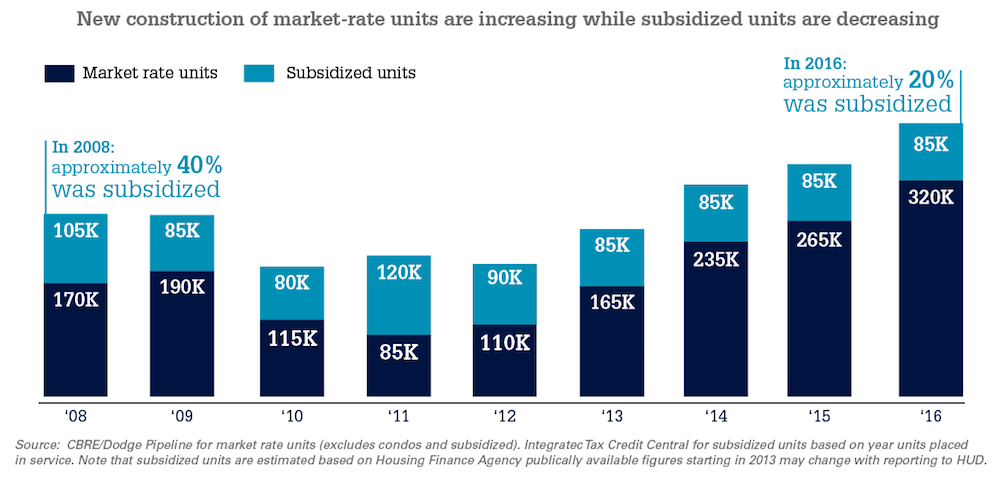Read Part 1 of this guest blog here.
While the need to build or rehabilitate more affordable units is urgent, we can’t simply build our way out of the rental housing crisis. Instead, we need to find a way to help lower-income households afford the housing that is available to them. Communities are doing this with a variety of tools.
Inclusionary Zoning
Many cities and some states now require that new apartment projects include units that are affordable to renters with low to moderate incomes, a practice called inclusionary zoning.
While popular, this has been controversial because it is expensive for the developers. The cost of construction and real estate taxes can be as high for the low-income units as for more expensive units, even though the affordable units generate less revenue. We need to find ways to make inclusionary zoning effective for low-income renters while not penalizing developers.
Housing Choice Vouchers
Another strong policy tool to help tenants pay for rental housing is the “Section 8” Housing Choice Voucher Program. Low-income renters in the program pay 30% of their incomes toward housing, with the federally funded program paying the balance to the landlord up to a set maximum. Housing vouchers are administered by local public housing agencies.
Demand is so great, however, that thousands of families can linger for years on waitlists in some cities with no assurance they will ever receive a voucher. Today, about 2.2 million low-income renter households receive vouchers, while millions of households are eligible but don’t receive them. By some estimates, only one in four eligible households receive any kind of rental assistance. Created in the 1970s, it may be time to take a fresh look at the voucher system to ensure we’re effectively serving today’s households.
HUD Rental Assistance
The housing community also can support efforts to modernize aging public housing stock by participating in the Department of Housing and Urban Development Rental Assistance Demonstration program. The program allows local housing authorities to leverage private sector financing to improve the physical condition and extend the useful life of public housing properties throughout the U.S., so we don’t lose these valuable affordable housing units.
Federal Low-Income Housing Tax Credit Projects
Continuing to provide loans for federal low-income housing tax credit (LIHTC) projects, which attract private capital to the low-income housing rental market, is another critical component of affordable housing. The LIHTC program has built nearly 3 million apartment units, housing about 6.7 million low-income families and currently finances the construction and rehabilitation of almost all subsidized housing in the U.S. Between 90,000 to 95,000 apartments units are built each year using LIHTC, helping thousands of Americans find affordable housing.
Moving forward together
There is no panacea for solving this crisis. Solving this puzzle will require multiple solutions and multiple partnerships. We’ll need the collective wisdom of lenders and renters, developers and housing experts, and advocates for health, education and the environment.
Fannie Mae wants to work with all those who have a stake in affordable housing to take a fresh look at the path forward. Specifically, we want to bring together affordable housing investors and state and local government representatives to identify the best ways to create more units that are affordable to low and moderate-income renters. More broadly, we want to expand our network of affordable housing partners to include more investors, lenders, and other organizations with a vested interest in addressing the affordable housing crisis.
We want above all else to help more people in America find safe, affordable options across the nation – new places they can call home.



